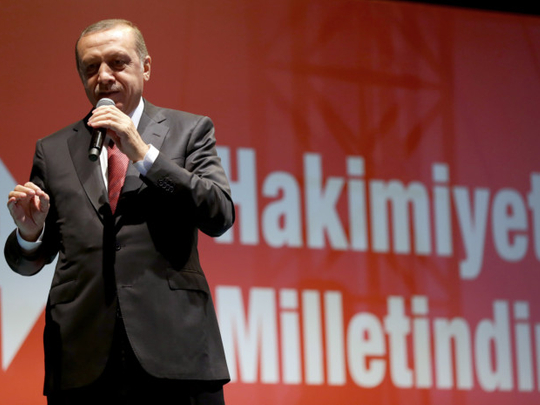
The military coup that was launched, and that failed, between last Friday night and Saturday morning, showed the two faces of today’s Turkey in sharp relief. On the one hand, there was the old tendency of the military to take responsibility on itself for the nation, with officers casting themselves as the guardians of law and order and the secular state.
On the other, there was a new sense of pride in even flawed democracy that brought people, young and old, religious and not, into the streets to oppose an illegal seizure of power. The people won; so far, so good. The aftermath is starting to look a lot less palatable. If the failure of the coup can be seen as a victory for modern, European, democratic Turkey — or at least aspirations in that direction — it is not at all apparent that the trend will continue.
There are now believed to be 6,000 people under arrest, including senior members of the armed forces and — more surprisingly — of the judiciary. Turkish President Recep Tayyip Erdogan appears to be exploiting his position to eliminate his enemies, far beyond those actually responsible for the plot against him. Nor is “eliminate” necessarily too strong a word: He has called for the return of the death penalty and whipped up enthusiastic crowds in his support. The proposition could be put to parliament.
Turkey abolished the death penalty in 2004, when it joined the Council of Europe. The move was part of its pursuit of European credentials at a time when its ambitions to join the European Union (EU) were at their height. Reinstating the death penalty would be a highly retrograde step, doubly so if it were done as a response to a particular event. Asking parliament to decide, in such circumstances, could be seen as an improvement on summary justice — which also appears to be a possibility — but not by much.
With the Turkish state as fragile as it is, any appeal to the president to stay his hand could be difficult. Beyond making the strongest possible diplomatic representations, is there anything either the Council of Europe, in the shape of the European Court at Strasbourg, or the EU can do? The first move may be a little self-examination. Even so stable a state as the United Kingdom retained the death penalty for treason until 1998, even though it had been abolished for other crimes decades earlier. It is hard to regard the coup attempt in Turkey as anything other than treason. With the Turkish state as fragile as it evidently still is, any appeal to the president to stay his hand could be difficult. Attempts should nonetheless be made.
On a hierarchy of priorities, the first should be opposition to summary justice. The second should be a demand for due process: No mass trials or convictions. Rank and file conscripts cannot be held accountable for the plotting of their superiors. The failed coup should not provide a pretext for the president to purge his political enemies more broadly. Any moral superiority he may now command will soon dissipate. It has to be recognised, however, that the persuasive power of Strasbourg is restricted to the moral plane, while the bargaining clout of Brussels is limited.
The EU is more dependent on Turkey’s good will than it was before the agreement on repatriating migrants, however questionable that deal was and however imperfectly it is operating. The ray of hope is that Turkey entered into that agreement at all, which suggested that Erdogan and his government had an interest not just in the money, but in keeping the country’s EU application alive. With the survival of democracy at risk, the Turkish president’s priorities may have changed, but the EU’s priorities for aspiring members — including respect for the rule of law — should not.
— Guardian News & Media Ltd
Mary Dejevsky is a writer and broadcaster, a member of the Valdai Group and a member of the Chatham House think-tank.












